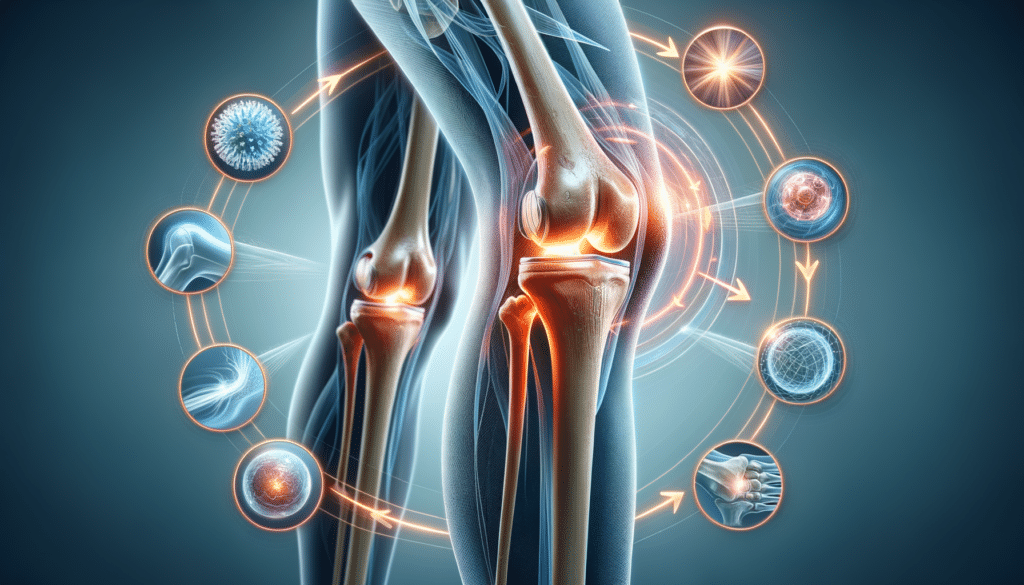Understanding Knee Arthritis: Causes and Symptoms
Knee arthritis is a prevalent condition that affects millions of people worldwide, primarily those over the age of 50. Arthritis in the knee occurs when the cartilage that cushions the joint wears down over time, leading to pain, stiffness, and swelling. The most common types of arthritis affecting the knee include osteoarthritis, rheumatoid arthritis, and post-traumatic arthritis.
Osteoarthritis is the most widespread form and is often associated with aging. It involves the gradual degeneration of joint cartilage and changes in the underlying bone. Rheumatoid arthritis, on the other hand, is an autoimmune disorder that causes the body to attack its own tissues, including the joints. Post-traumatic arthritis can develop after an injury to the knee, such as a fracture or ligament tear.
Symptoms of knee arthritis can vary but typically include:
- Pain and stiffness, especially after periods of inactivity or excessive use.
- Swelling due to inflammation in the joint.
- Reduced range of motion, making it difficult to bend or straighten the knee.
- A feeling of warmth in the joint.
Understanding these symptoms and their causes is the first step in managing knee arthritis effectively. Early diagnosis and treatment can help slow the progression of the disease and improve quality of life.
Conventional Treatments for Knee Arthritis Pain Relief
There are several conventional treatments available for managing knee arthritis pain, ranging from lifestyle changes to medical interventions. The treatment plan often depends on the severity of the condition and the patient’s overall health.
Lifestyle modifications are typically the first line of defense. These include maintaining a healthy weight to reduce stress on the knees, engaging in low-impact exercises such as swimming or cycling, and using supportive devices like knee braces or shoe inserts.
Medications are commonly used to relieve pain and inflammation. Nonsteroidal anti-inflammatory drugs (NSAIDs) like ibuprofen and naproxen are frequently prescribed. In more severe cases, corticosteroid injections may be administered directly into the knee joint to provide temporary relief.
Physical therapy plays a crucial role in strengthening the muscles around the knee, improving flexibility, and reducing pain. A physical therapist can design a personalized exercise program to help patients manage their symptoms effectively.
In cases where conservative treatments do not provide adequate relief, surgical options such as arthroscopy, osteotomy, or knee replacement may be considered. These interventions can help restore function and alleviate pain, but they come with risks and require a significant recovery period.
Exploring Alternative Therapies for Knee Arthritis
In addition to conventional treatments, many individuals with knee arthritis seek alternative therapies to complement their pain management strategies. These therapies often focus on holistic approaches that address both physical and emotional well-being.
Acupuncture, an ancient Chinese practice, involves inserting thin needles into specific points on the body to relieve pain and promote healing. Some studies suggest that acupuncture can help reduce knee arthritis pain by stimulating the release of endorphins, the body’s natural painkillers.
Herbal supplements are also popular among those seeking natural remedies. Glucosamine and chondroitin sulfate are commonly used to support joint health, although research on their effectiveness is mixed. Turmeric, known for its anti-inflammatory properties, is another supplement that may offer relief.
Massage therapy can provide temporary pain relief and improve circulation, helping to reduce stiffness and swelling. It is often used in conjunction with other treatments to enhance overall well-being.
Mind-body practices such as yoga and tai chi are increasingly recognized for their ability to improve flexibility, balance, and mental health. These gentle exercises can help manage stress and enhance physical function, making them valuable additions to a comprehensive arthritis management plan.
The Role of Diet and Nutrition in Managing Knee Arthritis
Diet and nutrition play a significant role in managing knee arthritis symptoms. A well-balanced diet can help reduce inflammation, maintain a healthy weight, and support overall joint health.
Anti-inflammatory foods are particularly beneficial for those with arthritis. These include:
- Fatty fish rich in omega-3 fatty acids, such as salmon and mackerel.
- Fruits and vegetables high in antioxidants, like berries, leafy greens, and tomatoes.
- Nuts and seeds, which provide healthy fats and essential nutrients.
- Whole grains, which can help reduce inflammation markers in the body.
Conversely, it is advisable to limit the intake of processed foods, sugary snacks, and red meat, as these can exacerbate inflammation and contribute to weight gain.
Staying hydrated is also crucial, as water helps maintain joint lubrication and supports overall bodily functions. Herbal teas and broths can be good alternatives to sugary beverages.
For some individuals, specific dietary supplements may be recommended to support joint health. Vitamin D, calcium, and omega-3 supplements can be beneficial, but it is essential to consult with a healthcare provider before starting any new supplement regimen.
Living with Knee Arthritis: Tips for Daily Management
Living with knee arthritis requires a proactive approach to managing symptoms and maintaining a high quality of life. Here are some practical tips to help individuals cope with the challenges of this condition:
- Stay active with regular, low-impact exercises that strengthen the muscles around the knee and improve flexibility.
- Use assistive devices such as canes or walkers to reduce strain on the knees during daily activities.
- Apply heat or cold therapy to the affected area to alleviate pain and stiffness.
- Practice good posture to minimize stress on the joints.
- Engage in relaxation techniques such as deep breathing or meditation to manage stress and improve mental well-being.
It’s also essential to maintain open communication with healthcare providers to monitor the progression of the disease and adjust treatment plans as needed. Support groups and counseling can provide emotional support and valuable insights from others living with arthritis.
By adopting a balanced approach that includes both medical and lifestyle interventions, individuals with knee arthritis can manage their symptoms effectively and continue to lead active, fulfilling lives.




